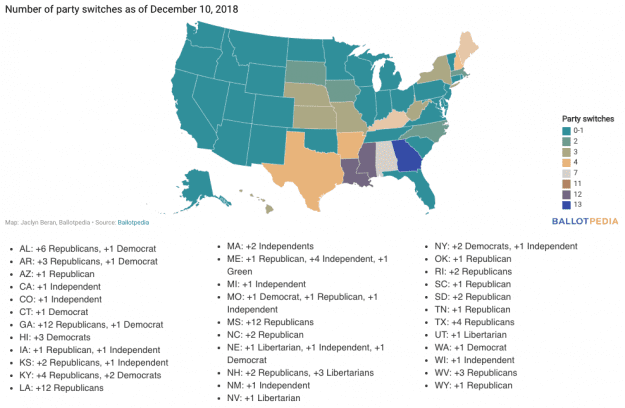A Kansas state senator has switched parties from Republican to Democrat. What is her reasoning? Senator Barbara Bollier states she cannot be complicit in supporting President Donald Trump.
With her district already leaning Democratic, her past voting history of voting opposite of her Republican party, and her vocal past endorsed of Governor-Elect Democrat Laura Kelly when she was a candidate for governor, it is no shock that she flipped to the Democratic side of the aisle. What about her reasons for the swap now?
“I cannot be complicit in supporting that,” Bollier said, referring to Trump’s presidency. “I can’t call it leadership. I don’t even know what to call him. He is our president, but he is not representing my value system remotely.” – kansascity.com
 Bollier states that Trump's leadership and policies are a major factor in her decision, but also it was issues concerning Medicaid expansion, gay rights, and the Kansas Republican Party vote to ‘oppose all efforts to validate transgender identity’. This anti-transgender vote was in February 2018, but in June, the party added to their stance/platform by inserting: “We believe God created two genders, male and female.”
Bollier states that Trump's leadership and policies are a major factor in her decision, but also it was issues concerning Medicaid expansion, gay rights, and the Kansas Republican Party vote to ‘oppose all efforts to validate transgender identity’. This anti-transgender vote was in February 2018, but in June, the party added to their stance/platform by inserting: “We believe God created two genders, male and female.”
“That was my final, last straw. I support the people of Kansas. I do not condemn whoever they are,” Bollier said.
Is it such a bad thing to be a moderate in any party? With politics as they are, the answer is yes. Bollier believes the Republican party is looking to remove all moderates.
Kansas Senate President Susan Wagle has some strong actions and words for Bollier. Wagle did strip Bollier, a retired physician, from the Senate Health Committee Vice Chair position on the health committee back in July because Bollier was endorsing Demorats. Wagle stated Bollier has a very liberal voting record, even more liberal than some Democrats, and jeered:
It’s “no shock she joined the party of Nancy Pelosi."
“The only surprise is that she didn’t end her façade of being a Republican sooner."
There was no major power swing when Bollier's move from R to D occurred since the count in the Kansas Senate is now 10 Democrats to 30 Republicans.
“They elected me as a moderate knowing nine years of voting history that I do not vote along party lines,” Bollier said. “Never have, never will.”
One state south in Oklahoma, where the Republicans control both House (now 72-24) and Senate (39-9), a representative just changed parties from Democrat to Republican.
"This to me is not at all about party affiliation," Representative Johnny Tadlock said in a House news release. "This is about representing the people who live in my district to the best of my ability and making sure their voice is heard at the state Capitol."
"I have not changed my beliefs."
"As a Democrat, I was endorsed by the National Rifle Association. I have always been pro-life. I have cared about safe and decent roads and bridges, public safety, free and fair public education and health care that reaches those in rural communities. These are still the issues with which I will be concerned."
Can Tadlock do more for his constituents after the switch? He thinks being a part of the majority is how he will help his voters. Tadlock represents the small town of Idabel located in the southeastern corner of Oklahoma. Only four of the 24 remaining House Democrats are from outside of the metropolitan areas of Oklahoma City, Tulsa ,and Norman.
Which elected official got it right?
Is it better to belong to the party that aligns wth your beliefs and those of your constituents as Bollier did?
Or is it better to fight the beast form within, belong to the party that is in control so that your voice is heard as Tadlock believes?
Some of the bigger political party changes in the past have been the governor of West Virginia became a Republican in 2017 and in October 2018 a Maryland Republican state representative became a Democrat; she as well cited Trump for her change.
The ballotpedia.org page displays the state legislators who at some point in their career have switched their political party affiliation. These are not elected officials at the federal government level.
There have been 111 state legislators that have switched parties since 1994; 33 state senators and 78 state representatives.
Number of state lawmakers who switched from Democrat to Republican: 70
- State senators: 22
- State representatives: 48
Number of state lawmakers who switched from Republican to Democrat: 14
- State senators: 4
- State representatives: 10





We get a number of switcheroo
We get a number of switcheroo politicians in New York too. I wonder which state gets the most.